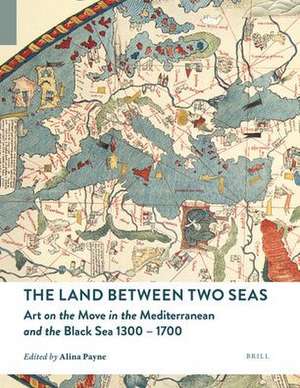The Land between Two Seas: Art on the Move in the Mediterranean and the Black Sea 1300–1700: Mediterranean Art Histories, cartea 5
Editat de Alina Payneen Limba Engleză Hardback – 26 iul 2022
Preț: 540.05 lei
Preț vechi: 635.34 lei
-15% Nou
Puncte Express: 810
Preț estimativ în valută:
103.35€ • 112.22$ • 86.81£
103.35€ • 112.22$ • 86.81£
Carte indisponibilă temporar
Doresc să fiu notificat când acest titlu va fi disponibil:
Se trimite...
Preluare comenzi: 021 569.72.76
Specificații
ISBN-13: 9789004513822
ISBN-10: 9004513825
Pagini: 330
Dimensiuni: 210 x 270 mm
Greutate: 1.59 kg
Editura: Brill
Colecția Brill
Seria Mediterranean Art Histories
ISBN-10: 9004513825
Pagini: 330
Dimensiuni: 210 x 270 mm
Greutate: 1.59 kg
Editura: Brill
Colecția Brill
Seria Mediterranean Art Histories
Notă biografică
Alina Payne is Professor of History of Art and Architecture at Harvard University and Director of Villa I Tatti (Florence). Author most recently of L’architecture parmi les arts. Matérialité, transferts et travail artistique dans l’Italie de la Renaissance (Hazan/Louvre 2016), she received the Max Planck/Alexander von Humboldt Prize and is Fellow of the American Academy of Arts and Sciences.
Cuprins
Acknowledgments
List of Figures
Notes on Contributors
Introduction: From Riverbed to Seashore
Alina Payne
1 The Late Sixteenth-Century Ship in the Adriatic as a Cultural System
Mirko Sardelić
2 Peripheral or Central? The Fortification Architecture of the Sanmichelis in Dalmatia
Ana Šverko
3 Daniel Rodriga’s Lazaretto in Split and Ottoman Caravanserais in Bosnia
The Transcultural Transfer of an Architectonic Model
Darka Bilić
4 The Vila in Renaissance Dubrovnik
“Where Art Has Tamed the Wild Nature”
Joško Belamarić
5 Visualizing Illyrianism in Urban VIII’s Rome
Daniel Premerl
6 “Vampire Trouble Is More Serious Than the Mighty Plague”
The Emergence and Later Adventures of a New Species of Evildoers
Cemal Kafadar
7 Transcultural Ornament and Heraldic Symbols
An Investigation into the Aesthetic Language of Early Modern Crimea and the Northern Black Sea Shore (Thirteenth–Sixteenth Centuries)
Nicole Kançal-Ferrari
8 Romes Outside of Italy
Alevisio Novy and the Circulation of Renaissance Architecture in Muscovy and the Crimea
Tatiana Sizonenko
9 The Mangalia Mosque in the Waqf Empire of an Ottoman Power Couple
Princess İsmihan Sultan and Sokollu Mehmed Pasha
Gülru Necipoğlu
10 Goldsmithery Made for the Cantacuzini
How Şeytanoğlu’s Descendants Made the Arts Flourish in Wallachia
Anna Mária Nyárádi
11 The Reliquary of St. Niphon
Relations between Wallachia, Constantinople, and Mt. Athos
Ioli Kalavrezou
12 Between Venice and the Danube
Hieromonk Makarije and His Cyrillic Incunabula at the Turn of the Sixteenth Century
Vladimir Simić
13 Between Worlds: Ottoman Heritage and Its Baroque Afterlife in Central Europe
Iván Szántó
14 Portability, Mobility, and Cultural Transfers—Wooden Church Architecture in Early Modern Banat
The Case of the St. Paraschiva Wooden Church in Crivina de Sus
Diana Belci
15 Ottoman and Persian Luxury between Fashion and Politics
The Armenian Merchant Network and the Making of Sarmatian Culture in the Early Modern Poland-Lithuania
Alexandr Osipian
16 Sociability Seeps through the Lower Danube
The Introduction of Coffee to Moldavia and Wallachia in the Seventeenth Century
Daniela Calciu
17 On the Road to the “New Empire”
The Afterlife of Roman and Byzantine Porphyry and the White Marble Tradition in Central Europe during the Early Modern Era
Michał Wardzyński, PhD
Index
List of Figures
Notes on Contributors
Introduction: From Riverbed to Seashore
Alina Payne
Part 1: The Adriatic
1 The Late Sixteenth-Century Ship in the Adriatic as a Cultural System
Mirko Sardelić
2 Peripheral or Central? The Fortification Architecture of the Sanmichelis in Dalmatia
Ana Šverko
3 Daniel Rodriga’s Lazaretto in Split and Ottoman Caravanserais in Bosnia
The Transcultural Transfer of an Architectonic Model
Darka Bilić
4 The Vila in Renaissance Dubrovnik
“Where Art Has Tamed the Wild Nature”
Joško Belamarić
5 Visualizing Illyrianism in Urban VIII’s Rome
Daniel Premerl
Part 2: The Black Sea From the Dardanelles to the Sea of Azov
6 “Vampire Trouble Is More Serious Than the Mighty Plague”
The Emergence and Later Adventures of a New Species of Evildoers
Cemal Kafadar
7 Transcultural Ornament and Heraldic Symbols
An Investigation into the Aesthetic Language of Early Modern Crimea and the Northern Black Sea Shore (Thirteenth–Sixteenth Centuries)
Nicole Kançal-Ferrari
8 Romes Outside of Italy
Alevisio Novy and the Circulation of Renaissance Architecture in Muscovy and the Crimea
Tatiana Sizonenko
9 The Mangalia Mosque in the Waqf Empire of an Ottoman Power Couple
Princess İsmihan Sultan and Sokollu Mehmed Pasha
Gülru Necipoğlu
10 Goldsmithery Made for the Cantacuzini
How Şeytanoğlu’s Descendants Made the Arts Flourish in Wallachia
Anna Mária Nyárádi
11 The Reliquary of St. Niphon
Relations between Wallachia, Constantinople, and Mt. Athos
Ioli Kalavrezou
12 Between Venice and the Danube
Hieromonk Makarije and His Cyrillic Incunabula at the Turn of the Sixteenth Century
Vladimir Simić
Part 3: The Danube and Beyond
13 Between Worlds: Ottoman Heritage and Its Baroque Afterlife in Central Europe
Iván Szántó
14 Portability, Mobility, and Cultural Transfers—Wooden Church Architecture in Early Modern Banat
The Case of the St. Paraschiva Wooden Church in Crivina de Sus
Diana Belci
15 Ottoman and Persian Luxury between Fashion and Politics
The Armenian Merchant Network and the Making of Sarmatian Culture in the Early Modern Poland-Lithuania
Alexandr Osipian
16 Sociability Seeps through the Lower Danube
The Introduction of Coffee to Moldavia and Wallachia in the Seventeenth Century
Daniela Calciu
17 On the Road to the “New Empire”
The Afterlife of Roman and Byzantine Porphyry and the White Marble Tradition in Central Europe during the Early Modern Era
Michał Wardzyński, PhD
Index





